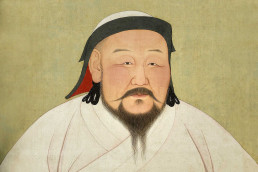From Conquest to Dynasty - The Rise and Legacy of Kublai Khan
Upon the death of Möngke, the fourth Mongol great khan, in 1259, his brother Kublai had no doubt as to his rightful successor. While Möngke had been extending Mongol dominion into Syria in the far west, Kublai had already proven himself as a skilled general by conquering vast territories, including parts of southwestern China and what is now Vietnam. However, despite Kublai’s demonstrated capabilities, there were rival claims to authority.
Kublai received word that his brother Arigböge also aspired to declare himself emperor. At the age of 45, Kublai swiftly made his way to his residence at Shangdu (later immortalized as Xanadu in Samuel Taylor Coleridge’s famous poem “Kubla Khan”) to deliberate on his next course of action.
Recognizing the necessity of both diplomatic finesse and military prowess to govern the extensive Mongol domains stretching from northern China through Persia to Russia, Kublai faced the challenge posed by Arigböge. In response, he opted for a significant ritual to solidify his claim to the throne. After consulting his advisers, Kublai decided to legitimize his rule by consulting the I Ching, an ancient Chinese divination system with ties to Confucianism and Taoism. Through this solemn ceremony, Kublai sought assurance of success on the path he chose to pursue.
Kublai’s decision to embrace a Chinese tradition rather than a Mongol one underscored a persistent dilemma throughout his life. He was motivated by the unrealized ambition of his grandfather, the formidable conqueror Genghis Khan, who aspired to unite all of China under Mongol rule. Kublai understood that conquering China was one challenge, but effectively governing it presented another. It demanded a delicate balance of appealing to the newly subjugated Chinese populace while upholding Mongol loyalty.
The I Ching ritual, with its blend of reverence and political significance, proved fruitful: Kublai ascended to power as Kublai Khan, vanquished Arigböge four years later, and emerged as the sole ruler of the world’s largest contiguous land empire, spanning from the Pacific Ocean to the Black Sea.
Kublai Khan’s Rise to Power
In 1206, Genghis Khan united the Mongol tribes and redirected their ambitions far beyond their homeland. By the time of Genghis’s death in 1227, they had nearly conquered the Jin dynasty of northern China and vast expanses of Central Asia.
The title of “khan,” often denoted as “khagan,” meaning “ruler” or “great khan,” passed from Genghis to his son Ögödei, and then to his grandson Güyük, before Möngke succeeded in 1251. Kublai, Möngke’s brother, born in 1215, was the son of Tolui and Sorghaghtani, a member of an Eastern Christian sect. Sorghaghtani played a pivotal role in ensuring Möngke’s succession and shaping Kublai’s upbringing.
Under Sorghaghtani’s guidance, Kublai received instruction in Mongol traditions while also being exposed to other faiths and cultures, including Islam and Chinese traditions. This multicultural education would later inform his approach to governance.
As a military leader, Kublai demonstrated his prowess during Möngke’s territorial expansions, employing the brutal methods typical of Mongol conquests.
Challenges and Triumphs
Upon his proclamation as khagan in 1260, Kublai confronted Arigböge’s rival claim to the throne before resuming military campaigns. Internal tensions began to threaten the unity of the Mongol empire, leading to its fragmentation into sub-khanates.
After defeating Arigböge in 1264, Kublai resumed his campaigns against the Southern Song dynasty in China. Despite facing formidable resistance from the Song, Kublai’s perseverance led to their eventual defeat in 1279, marking the unification of China under Mongol rule.
Establishing a New Dynasty
As Kublai expanded his control over China, he declared the establishment of a new dynasty, the Yuan, in 1271. Recognizing the importance of embracing Chinese culture, Kublai adopted Chinese customs, governance practices, and attire. He relocated the capital to Dadu (present-day Beijing) to centralize imperial power within Chinese territory.
Kublai’s reign saw the integration of foreign advisers into his administration, including the famous traveler Marco Polo. However, tensions persisted between the Mongol elite and the Chinese populace, exacerbating social and political divisions within the Yuan dynasty.
Legacy and Decline
Kublai nominated his grandson Temür as his successor before his death in 1294. Despite his accomplishments in unifying China and establishing the Yuan dynasty, Kublai’s reliance on Chinese customs alienated Mongol aristocrats, contributing to the destabilization of Mongol rule. Though the Yuan dynasty enjoyed relative stability and prosperity during Kublai’s reign, it ultimately succumbed to internal strife and external pressures within a century of his death.
